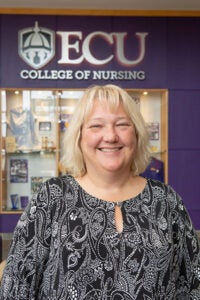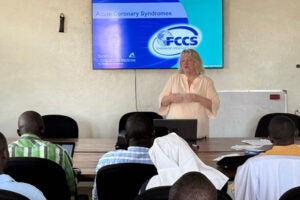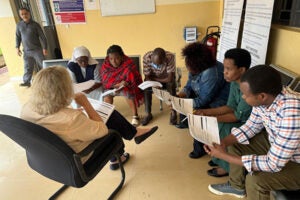Critical care lessons help bridge global health gaps
A plane ticket to Butare, Rwanda isn’t cheap, but it’s hard to put a price tag on the lifesaving skills that East Carolina University’s College of Nursing professor Dr. Kristie Hertel taught during an expedition to central Africa in late March.

Dr. Kristie Hertel is the director of the College of Nursing’s adult gerontology acute care nurse practitioner concentration.
Hertel, director of ECU’s adult gerontology acute care practitioner concentration, and members of the Carolinas/Virginias chapter of the Society of Critical Care Medicine taught 27 Rwandan nurses, anesthesiologists and nurse anesthetists a course titled the Fundamentals of Critical Care Support.
This trip was Hertel’s second to Rwanda. She was part of the society’s inaugural trip to Rwanda in 2018. The COVID-19 pandemic put a pause on subsequent training missions in 2020 and 2021, and an outbreak of a hemorrhagic fever in 2024 forced the team to shift its efforts by a few months.
The most recent trip emphasized the importance of bridging the language and technology barrier in the developing world, Hertel said.
A few years ago, Hertel and her teammates provided the same training in Israel and the West Bank to extend cutting edge critical care skills to doctors, nurses and anesthesiologists.
Since the mid-1800s, European control of and influence over Rwanda left the country with a handful of official languages, including Kinyarwanda as the home language of most. Since the 1960s, French was the language used by the government, but after the genocide of the mid-1990s, a concerted effort was made to shift to English for official business, including health care.
“Rwanda has instituted that all medical education material be in English, so that has helped us a little bit. The course is actually set up to be a two-day course, but we expand it to three days to give extra time for that language barrier,” Hertel said.
Language is a challenge when teaching peers in the developing world, Hertel said, but increasingly the real problem is lack of technology that can keep pace with Western advances in computer hardware and high-speed internet connectivity.

Hertel teaches a class to Rwandan health care professionals in Butare in March.
The computers her Rwandan students had access to couldn’t handle the testing software used for the course, so Hertel and her team settled for projecting the test on a screen and collecting the test results from printouts of the score sheets.
The availability of modern medical resources limits the levels of care that Rwandan medical professionals can provide their fellow citizens. Previous groups of Westerners had helped establish modern pre-hospital care infrastructure like ambulance services, but routine concerns in a Western hospital that wouldn’t raise an eyebrow — like providing food to patients — is a major hurdle in Rwandan hospitals.
“Here we put patients on tube feeds — over there families create pureed meals and bring them in because they don’t have the liquid, pre-packed tube feedings,” Hertel said. “Families have to pay for everything outright, so they just make food at home and bring it in.”
A further complication for the professionalization of the Rwandan health care system is centuries of civil strife that displaced untold numbers to neighboring Congo and has men sweeping the streets wearing green vests that signify they still owe community service for their part in the stunning violence of the genocide of 1994.
However painful the country’s past, Hertel said the motivation of her Rwandan peers to learn the most advanced techniques of critical care was equaled by the stunning natural beauty of the mountain rainforests and their residents.

Hertel speaks with Rwandan health care professionals during a training session in the city of Butare in March.
Rwanda in rainy season is a lush equatorial Eden, and a highlight of her time there was a once-in-a-lifetime visit with a troop of mountain gorillas.
“We saw a family of 35. There was a 2-year old and a 3-year old who were playing around like brothers and sisters, and a little 3-month-old baby that was just hanging on the mom,” Hertel said.
Resources are a challenge for the nation’s health care, but things are getting better, which makes the training that Hertel and her team are providing a critical asset for their Rwandan peers. When she was last in Rwanda in 2018, patients had to travel to Uganda to reach a catheterization lab, where less-invasive exploration of the heart can happen. There is now one in the capital of Kigali, a three-hour drive from Butare – but life-savingly closer.
Hertel said the health care establishment in Rwanda is making strides in delivering immediate care with hiring international doctors, but the focus remains on training homegrown professionals, which makes the training that she brought to Butare — the ingenuity required to help patch the gaps in care — so important.
“It’s interesting for us, coming from an industrialized country, because they don’t have accessibility to some of the medications that we’re used to — they’ve never heard of them. So, tailoring the education to what they have is critical,” Hertel said.
The people working in health care in developing nations, like Rwanda and the Middle East, are as intelligent as those in western democracies, Hertel said. They just lack the technology and infrastructure to match their Western peers.
“The stigma is in our heads. It’s often a language barrier. One of the other instructors said, ‘I don’t see how they’re going to pass this final exam because they just don’t get it,’” Hertel said. “It wasn’t that they didn’t get it, because everyone passed that exam.”